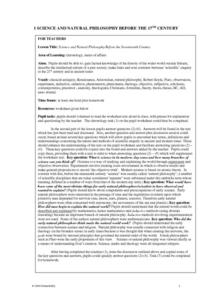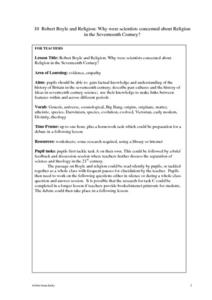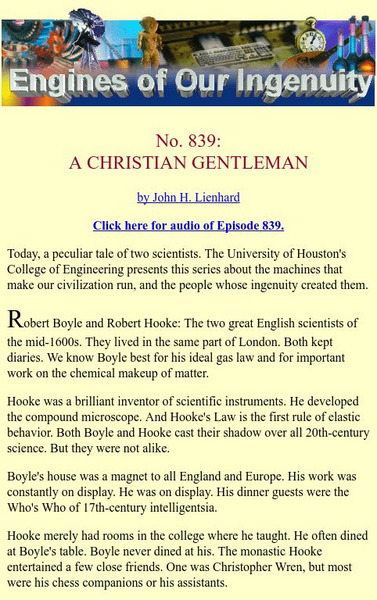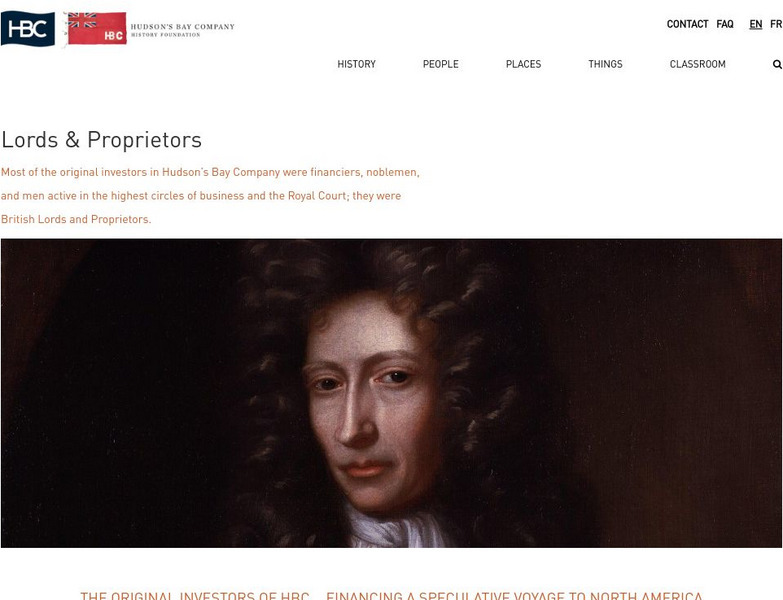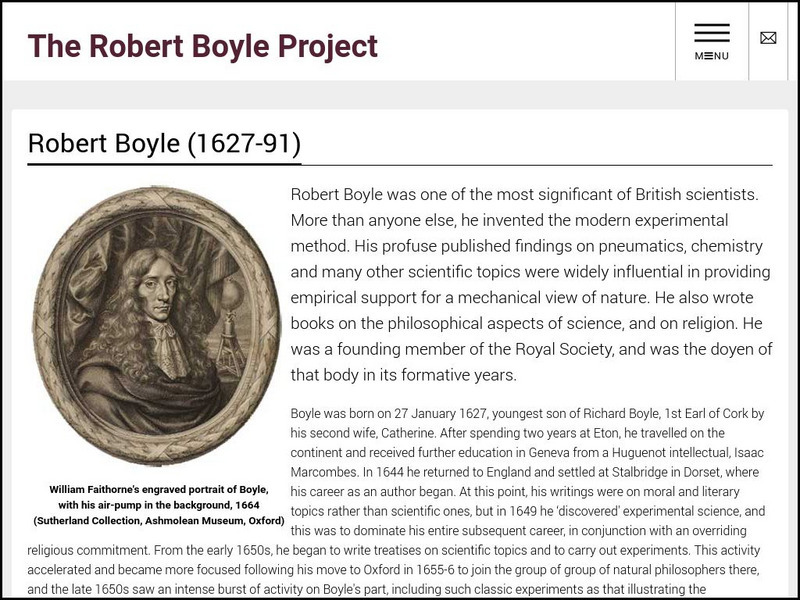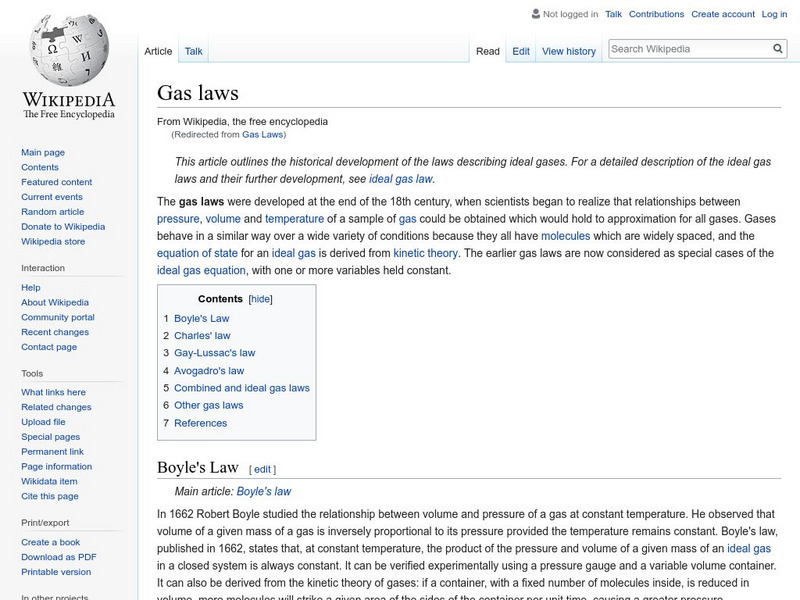Curated OER
Science and Natural Philosophy Before the Seventeenth Century
Learners complete a worksheet about some of the natural philosophers in history. They use graph paper and create a timeline with the dates of birth and names of a list of natural philosophers. They list four questions concerning life and...
Curated OER
Robert Boyle and the Mechanical Philosophy
Students read and discuss Boyle's Mechanical Philosophy and his rejection of Aristotle's theory of "Forms and Qualities." They answer a given set of questions and discuss these with the class.
Curated OER
Robert Boyle and the Royal Society
Students research Royal Society, explain reasons for its foundation, examine reasons why it is beneficial to modern scientists to work in teams, and identify ways scientists disseminate information.
Curated OER
The Writings of Robert Boyle
High schoolers read the introductory text describing the various sources for the history of Boyle's life. They produce a poster illustrating the sources of Boyle's life and writings.
Curated OER
Robert Boyle and Religion
High schoolers discuss past cultures and the history of ideas in seventeenth century science. They answer a list of questions and prepare for a debate on the subjects of science and religion and views on how the universe was created.
Curated OER
The Biography of Robert Boyle
Students research and chronologically sort written information about Boyle's life. They create a time line of importand events in Boyle's life and write a biography on Robert Boyle.
Curated OER
Robert Boyle and Oxford
Students investigate seventeenth century sources that reveal why Oxford became an outstanding centre of science during Boyle's residence. They write a summary of the information found on Oxford and Robert Boyle's accomplishments.
Curated OER
Robert Boyle's Informants
Students review and discuss the importance of Boyle's informants and how he sometimes relied on information from those with experience of the wider world to substantiate his scientific theories. They complete the worksheet, answering...
PBS
Pbs Learning Media: Discovering Air
Our understanding about the air we breathe has changed dramatically through time. This illustrated timeline from the NOVA Web site tracks the changing thought on air and the creation of the Periodic Table of the Elements.
University of Houston
University of Houston: Engines of Our Ingenuity: A Christian Gentleman
The transcript of a talk given on the syndicated radio broadcast titled "The Engines of Our Ingenuity." The story contrasts the lives and personalities of two scientific colleagues - Robert Hooke and Robert Boyle. Discusses their...
Vision Learning
Visionlearning: Chemical Relationships: Acids and Bases
An explanation of historical ideas that lead to the current day concepts of acids and bases. The Concept of pH is briefly introduced.
Other
Chemical Heritage Foundation: Robert Boyle
A biographical site on the life and work of Robert Boyle.
Hudson's Bay Company
Hudson's Bay Company: Lords & Proprietors
Who were the people who invested in the Hudson's Bay Company? Find out who these investors were and their reasons for investing.
Other
The Robert Boyle Project, University of London
Official homepage of Robert Boyle (1627-1691 CE). The site is very comprehensive in its information about Boyle. The site has links to a bibliography, his works, correspondence, etc.
Simon Fraser University
Chem1 Virtual Textbook: Pressure Volume Relations and Boyle's Law
The General Chemistry Virtual Textbook, or Chem 1, is broken into several sections covering various aspects of topics related to chemistry. This section deals specifically with Boyle's Law and its relation to other gas laws.
Wikimedia
Wikipedia: Boyle's Law
Wikipedia provides information on Boyle's Law, a gas law that relates the volume and pressure of an ideal gas held at a constant temperature.
Wikimedia
Wikipedia: Gas Laws
Wikipedia offers the definition of the gas laws, including Boyle's Law, Charles' Law, and Graham's Law. Also defines the term, "Ideal gas."
Other
Horror Vacui: Robert Boyle
A brief biography of Boyle, focused on his scientific achievements.
University of Pennsylvania
Boyle's Sceptical Chymist
Online text. Not only the complete text, but actual pictures from the original manuscript. Read this important work on chemistry the way it was presented in 1661. Use the navigation buttons to scroll through the pages.
Famous Scientists
Famous Scientists: Robert Boyle
This article will discuss the life and discoveries of Robert Boyle. Explore how Boyle developed the first gas law.
CK-12 Foundation
Ck 12: Physical Science: Boyle's Law
[Free Registration/Login may be required to access all resource tools.] Boyle's law and the relationship between the volume and pressure of a gas.
CK-12 Foundation
Ck 12: Physical Science: Boyle's Law
[Free Registration/Login may be required to access all resource tools.] Boyle's law and the relationship between the volume and pressure of a gas.
Wikimedia
Wikipedia: Gas Laws
This site from the encyclopedia Wikipedia provides a basic overview of the three gas laws (Boyle's, Charles', and Graham's Law) and information on the ideal gas law is found here.
Science Struck
Science Struck: Boyle's Law Explained
Gives brief biographical information for Robert Boyle and explains what Boyle's Law is and how to make calculations using his formula.


